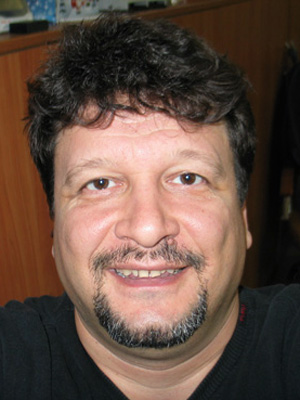One of the largest meetings of people working in the field of open source software took place over the weekend. The event is called OpenFest and the first edition of the annual forum took place back in 2003. The idea is gathering creators and fans of liberal arts and software. This way organisers aim to support free sharing of knowledge and experience. During the two days, thousands of enthusiasts took part in the forum. One of them was Tsvetan Uzunov. Four years ago, he accidentally discovered "OpenFest" and later even became one of the speakers at the event. For 25 years Tsvetan has been working in the sphere of electronic design and production of hardware and software, and in the past six years he has been making small Linux-based computers. They have gained great popularity and are the foundation of his annual presentation - "Create your own laptop." But how was the idea born?
 "The idea of this notebook occurred to me spontaneously. A year ago, cleaning up my office I found nine old laptops. I wondered what the reason for them to be there was. It turned out that two of them had quite weak processors; one had a broken display, while others had small mechanical defects. Back then repairing them was either impossible or quite expensive. Then I thought, if this thing can could be changed. I made a list of all the features that I wanted my laptop computer to have. I want it lightweight, with long-lasting battery. I wanted it to support the latest software and because I am a fan of open-source technologies, I wanted the system to be open source."
"The idea of this notebook occurred to me spontaneously. A year ago, cleaning up my office I found nine old laptops. I wondered what the reason for them to be there was. It turned out that two of them had quite weak processors; one had a broken display, while others had small mechanical defects. Back then repairing them was either impossible or quite expensive. Then I thought, if this thing can could be changed. I made a list of all the features that I wanted my laptop computer to have. I want it lightweight, with long-lasting battery. I wanted it to support the latest software and because I am a fan of open-source technologies, I wanted the system to be open source."
Let’s be honest. Each of us at work or at home has faced some of these problems and would like their computer to be a bit more customized to their needs. But how exactly open source software could help users?
"We want to offer this laptop as a kit. So everyone will be able to assemble it and know how every part of it works. Thus, users will be able to fix it themselves. If a component gets damaged, it could be replaced and you do not need to replace the whole machine. The idea is this kit to have educational value.”
Technology already has an important place in our lives and the sooner children learn about it, the more easily they understand it. If at school children learned how to assemble and program computers, this would surely contribute to their technical knowledge.
"In this way children will see that there is nothing scary or complicated about computers. Currently for many of them the computer is a black box with buttons and a display. They do not know what happens inside or are scared to open it and look inside as this would void the warranty. With this laptop there is no such problem”
The main advantages of open hardware and software are that one can learn from the code of others. Everyone can fit the computer to their needs. And last but not least, when all have access to the source code errors are much more easily detected and removed.
English: Alexander Markov
At the Bulgarian Embassy in London, Prof. Bettany Hughes presented excerpts from the new BBC series - Wonders of Bulgaria. Prof. Bettany Hughes is the author of two episodes of the documentary. Hughes is a historian, writer, author of..
According to the Annual Report on the Health Status of Bulgarian Citizens for 2023, t he main cause of death in Bulgaria is diseases of the cardiovascular system (61.1%), followed by oncological diseases (16.5%) and diseases of the respiratory system..
In the week of St. Andrew’s Day (also known as Bears’ Day or Mechkinden), WWF is drawing attention to six orphaned bear cubs who have been given a second chance at life. The initiative is part of the "Subscribe to Nature" campaign and..
Over 3.5 million Ukrainians have arrived in or passed through Bulgaria since the beginning of the war. Nearly 200,000 people have found temporary..
At the Bulgarian Embassy in London, Prof. Bettany Hughes presented excerpts from the new BBC series - Wonders of Bulgaria. Prof. Bettany..
An innovation for the treatment of diabetic foot ulcer using the patient's own tissue and artificial intelligence has been implemented at the University..

+359 2 9336 661
